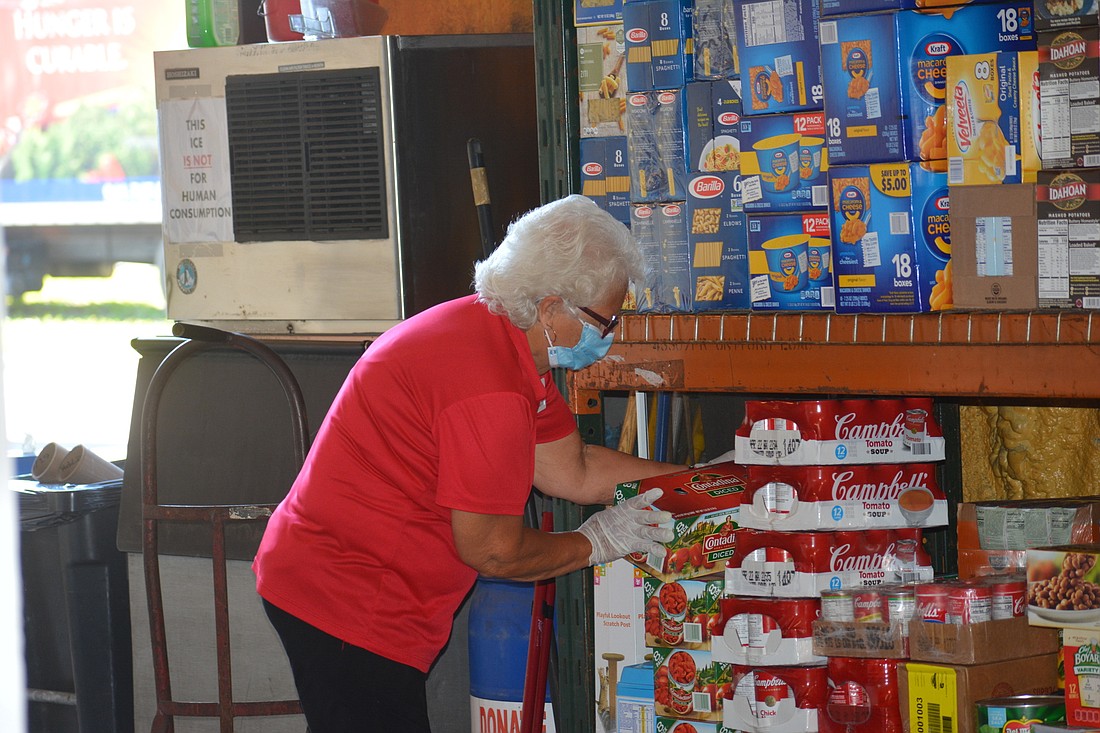- April 25, 2024
-
-
Loading

Loading

On a normal day, the campuses of Meals on Wheels Plus of Manatee welcome at least 100 volunteers, plus staff, completing all sorts of jobs. Some help greet people at the nonprofit’s dining centers. Some sort and stock food at its Food Bank of Manatee, and some are out in their cars, making their rounds to check in and deliver meals to customers across the county.
Of course, there are no more normal days.
As of the first week of May, the workforce has been reduced to 25 staff members and a handful of volunteers. A normally bustling food bank — the only food bank in the county — is eerily quiet, limited to 10 people inside at a time, clad in masks and gloves as they happily work among the warehouse’s shelves. When the weather allows, a few more volunteers can sort food outside, helping serve the increased demand caused by the coronavirus.
As CDC and state rules keep changing, Meals on Wheels Plus has changed with them, all while maintaining its focus on completing its mission: to serve and feed customers while staying healthy.
This is no simple task given the breadth and depth of the organization’s services. In some cases, such as with its dining centers, its whole purpose is to fight social isolation by bringing people together. In others, such as its meal delivery services, new protocols abound to ensure both volunteers and customers can stay safe while continuing to make these vital connections. Gone are the days of volunteers or staff members entering customers’ homes to have a chat and drop off meals. Instead, customers are asked to leave a chair or a stool outside their front door, where a staff member will leave the customers’ food. Its volunteer team has been restricted, with screening protocols in place to ensure all who serve are well.
“It’s tough for everyone because a lot of our customers have been with us for years,” says Amy Towery, the organization’s vice president of development. “They form bonds with our staff members and get to know each other. Not only do we deliver them meals, but we check on them and make sure they are doing OK. For some of them, our staff members are the only people they talk to all day. We did not want to take that away, but we did have to tell everyone not to give any hugs for a while. It’s hard but necessary.”
Customers and delivery people can still talk at a safe distance, Towery says, though the organization has changed its delivery pattern. Instead of delivering meals five days a week, it will deliver on Tuesdays and Fridays, each time giving enough food to last until the next delivery. This cuts down on potential virus transmissions while also, as a silver lining, allowing customers more choice in which meals they eat on which days.
Since the pandemic began in the U.S., food withdrawals at the food bank are up 65% from the same period in 2019, Towery says. The food bank is independent and relies solely on the community. Thanks to everyone’s generosity, it has been able to keep up with demand. The Giving Challenge on April 28-29 provided a particularly bright spot for the organization. Out of 687 participating organizations, it finished second in overall donations received during the 24-hour online fundraiser, with $295,320.
The Giving Challenge provided a much-needed boost, Towery says, but the need remains sobering. For example, the organization provides home delivery meals to 618 seniors. That amounts to 4,200 meals, at an average cost of $7 — which adds up to about $29,400 per week.
Without a crystal ball to see what the landscape will look like in six months, the organization is planning best it can and soliciting donations nonstop, both for food and cash. From past experiences, Meals on Wheels Plus knows the summer months are when donations crater and when demands peak because kids are missing meals at school. If everyday life is close to normal by that point, Towery says she hopes people do not forget about the charity because those kids will still need food. Nonperishables are especially helpful.
“We will accept whatever people can give, though,” Towery says. “Any food, we will put it to good use.”